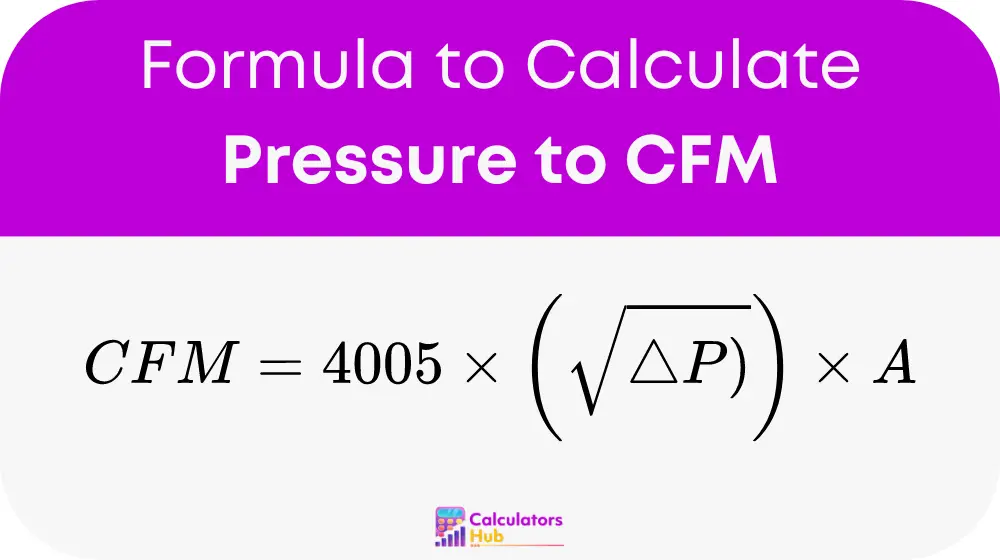The Pressure to CFM Calculator is a practical tool used primarily by HVAC engineers and technicians to convert different pressure readings into an airflow rate, which is essential for designing and assessing HVAC systems. This calculation helps in determining how much air can move through a duct at a given pressure, which is crucial for ensuring appropriate ventilation and air quality in buildings.
Formula of Pressure to CFM Calculator

Where:
- CFM: Cubic Feet per Minute (airflow rate)
- ΔP: Differential Pressure (measured in inches of water column, in.w.c.)
- A: Cross-sectional Area of the Duct (in square feet, ft²)
- √: Represents the square root
This formula assumes standard atmospheric pressure and conditions of dry air at 70°F (21°C).
Key Assumptions
- The air is dry and at standard atmospheric conditions.
- The ductwork is properly sealed and does not have significant leaks.
- Pressure measurements are accurate and taken at the correct locations in the duct.
Conversion Table for Common Calculations
Here's a table to help you convert different pressure values into CFM without manually calculating each time:
| Pressure (in.w.c.) | Area (ft²) | CFM |
|---|---|---|
| 0.1 | 1 | 126.5 |
| 0.2 | 1 | 179.0 |
| 0.3 | 1 | 219.0 |
| 0.5 | 1 | 283.5 |
| 1.0 | 1 | 400.5 |
| 2.0 | 1 | 566.4 |
Note: These values serve as a quick reference for standard 1 ft² duct area.
Example of Pressure to CFM Calculator
Scenario:
Calculate the CFM for a duct with a cross-sectional area of 2 ft² where the measured pressure difference is 0.5 inches of water column.
Calculation:
Using the formula:
CFM = 4005 * √(0.5) * 2
- Calculate the square root of the pressure difference: √(0.5) = 0.707
- Multiply the results to find the CFM:yaml
CFM = 4005 * 0.707 * 2 = 5664 * 2 = 1133 CFM
This calculation tells us that the airflow rate through the duct is 1133 CFM, which can be vital information for designing an HVAC system that meets specific ventilation needs.
Most Common FAQs
The constant 4005 is derived from the standard density of air at sea level and average temperatures (approximately 70°F or 21°C). It helps convert the airflow rate calculated in feet per minute and pressure in inches of water column into CFM.
The calculator is highly accurate under standard conditions (dry air at 70°F). However, variations in air density, temperature, or humidity can affect the results, and adjustments may be need for precise applications.
Yes, the calculator can be use for any duct size by adjusting the cross-sectional area (A) in the formula. Ensure the area is accurately measured in square feet for correct calculations.